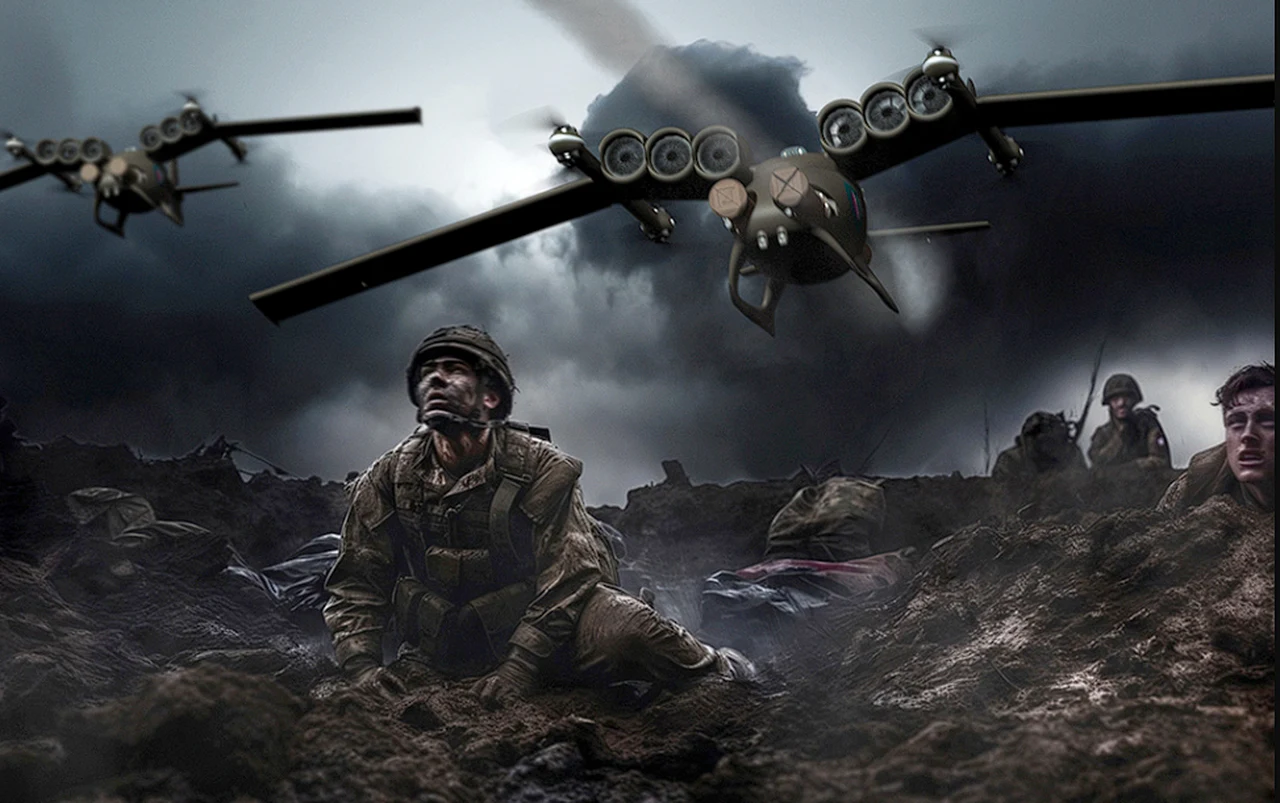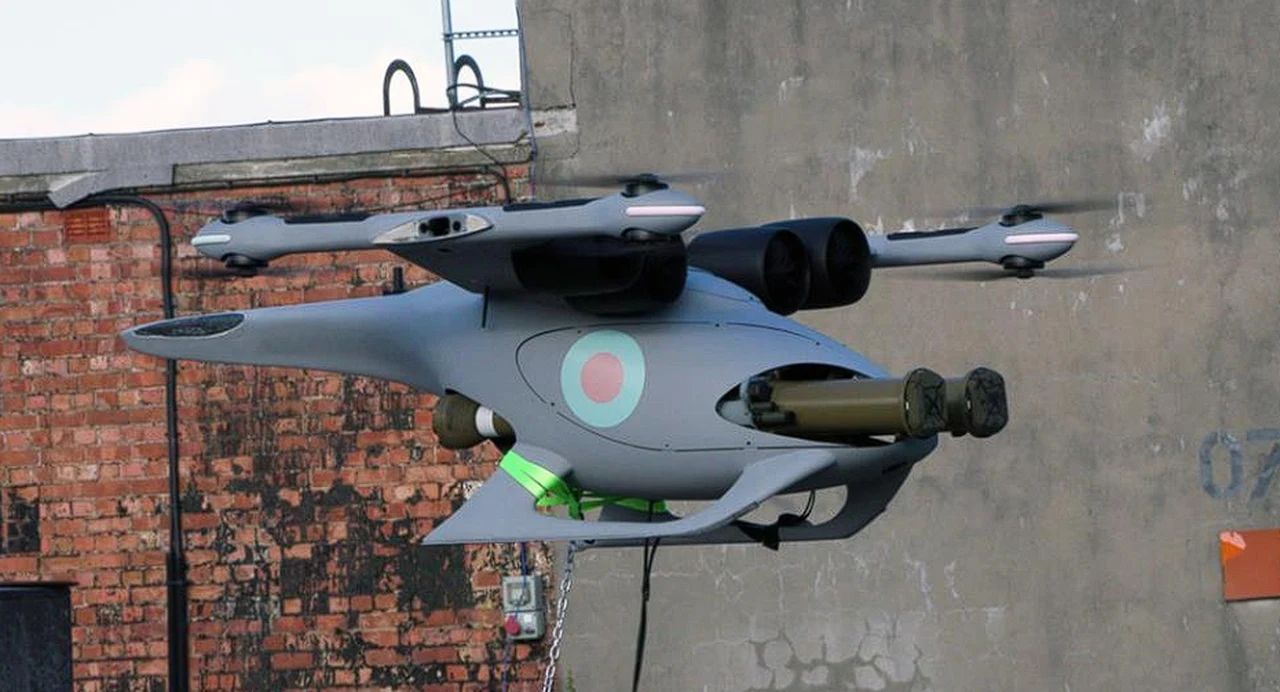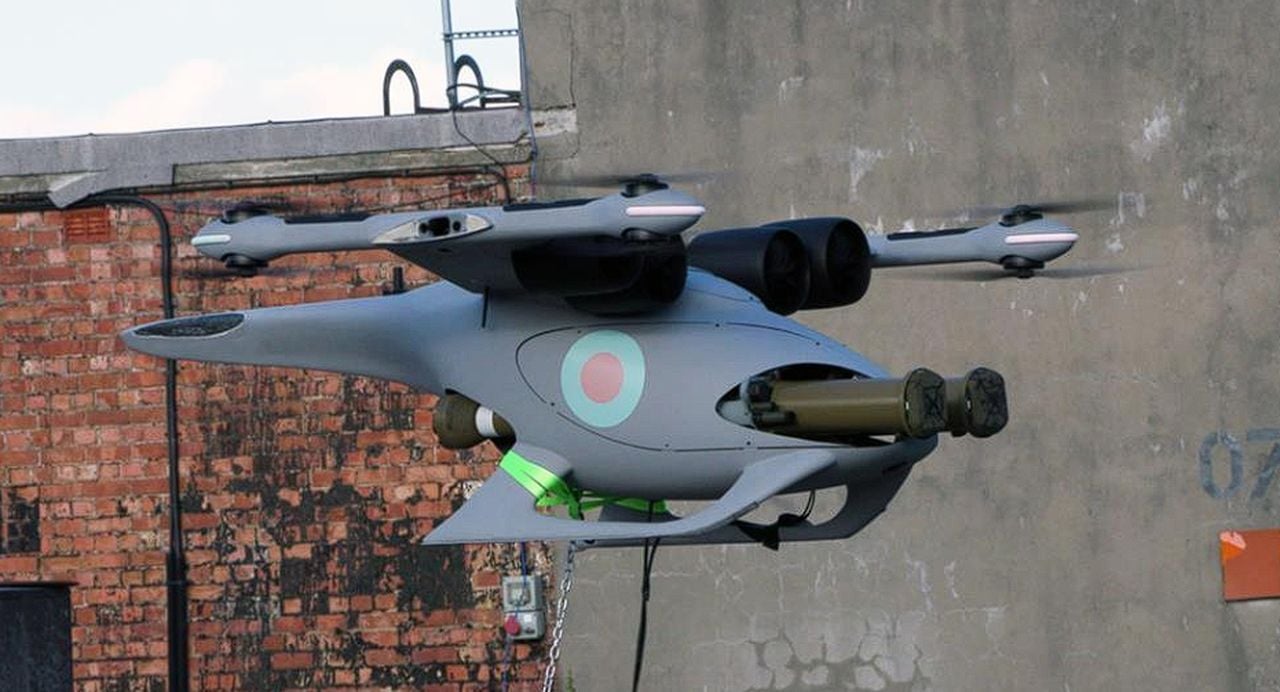
New drone technology is changing the face of warfare and how engagements will take place. Imagine a battlefield where the skies are dominated by a new kind of warrior, one that doesn’t tire, doesn’t fear, and operates with precision that is nearly impossible for human pilots. This isn’t a scene from a futuristic movie; it’s a reality that’s unfolding right now with the introduction of the Jackal drone. This advanced Unmanned Aerial Vehicle (UAV) is poised to redefine aerial combat with its cutting-edge features and capabilities.
Developed by Flyby Technology, in collaboration with Turkish and UK partners, the Jackal drone is a response to the changing landscape of warfare, as evidenced by recent conflicts such as those in Ukraine. It’s designed for quick deployment, and its ability to take off and land vertically means it can be used in a variety of environments without the need for a runway. This versatility is crucial for military operations in diverse and often difficult terrains.

As someone with a semi-technical background, you’ll find the Jackal’s missile system particularly interesting. It can launch lightweight multi-role missiles, a capability that has already been successfully tested with the Royal Air Force. This feature allows the Jackal to potentially take over the roles traditionally filled by manned attack helicopters and fighter jets, especially in air-to-ground combat missions.
Rocket equipped Jackal drone
One of the standout features of the Jackal is its modular design. This means that as technology evolves and warfare tactics change, the drone can be updated to meet new operational requirements. This adaptability is essential for maintaining a cutting-edge fleet without the excessive costs of developing entirely new models.
Stealth is another key element of the Jackal’s design. It can operate beyond the line of sight, making it much harder for enemy forces to detect. This stealth capability, combined with its autonomous control for reconnaissance and surveillance, allows the Jackal to carry out covert operations with a high degree of effectiveness.
Here are some other articles you may find of interest on the subject of drone technology and projects :
Vertical takeoff and landing
The Jackal’s vertical takeoff and landing capability is especially useful in challenging terrains that are typical in war zones. This feature ensures that the drone can be quickly deployed to support military operations in areas that are otherwise inaccessible to traditional aircraft. The Jackal drone has garnered interest from countries with more limited defense budgets, such as Ukraine, Iraq, and Taiwan. Taiwan, in particular, has placed a significant order, seeing the Jackal as an affordable solution to their defense needs.
Features of the Jackal Drone built for warfare
- Small, Lightweight Design: JACKAL is compact and designed for agility, facilitating operations in tight spaces and rapid maneuvering.
- Modular VTOL Capabilities: It features vertical take-off and landing, eliminating the need for runways and enabling deployment from concealed or unprepared locations.
- Multi-Role Attack Functionality: Capable of engaging targets over land, sea, and air, including air interdiction, close air support, and engaging helicopters and tanks.
- Payload and Range: It has a 15kg payload capacity and can operate up to a range of 130km, with a maximum altitude of 4,000m.
- Missile Launch Capability: Equipped to launch lightweight multi-role missiles (LMM), enhancing its combat versatility.
- Plug-and-Play System: Allows for the easy integration of new equipment and technology, adapting to evolving mission requirements and standards.
- Advanced Sensors and C2 Links: Features multi-spectral sensors for intelligence, surveillance, and reconnaissance (ISR) operations, and operates on secure command and control (C2) links with an operational range of up to 150km.
- Engine and Propulsion: Utilizes twin contra-rotating propellers for VTOL and electric ducted fan (EDF) engines for forward flight, enabling high-speed maneuvers and cruising.
- Speed: Can reach a maximum speed of 160km/h and cruise at 108km/h.
- Autonomous Flight Capabilities: Advanced software and sensor technology enable autonomous navigation and obstacle avoidance, enhancing its utility for reconnaissance and surveillance.
- Future Compatibility: Designed with a modular approach to accommodate future technological upgrades and regulatory requirements.
- Affordability and Accessibility: Provides an unmanned air combat solution for nations seeking cost-effective alternatives to traditional manned aircraft.
Advanced weaponry
The ongoing development and the move towards full-scale production of the Jackal drone signify an important development in aerial warfare. With its advanced weaponry, stealth features, and autonomous capabilities, the Jackal is indicative of a shift towards a future where unmanned systems play a crucial role in military strategy. It offers a cost-effective and flexible option for defense forces worldwide, ensuring that they can keep pace with the rapid advancements in military technology.
The Jackal drone is not just another UAV; it’s a sophisticated piece of technology that could very well become the backbone of air combat in the years to come. Its introduction into military arsenals around the world will likely have a significant impact on how conflicts are fought and won. With the Jackal in the sky, the dynamics of warfare could be altered in a way that prioritizes speed, stealth, and precision above all else.
Military Technology
As the world watches the evolution of military technology, the Jackal drone stands out as a prime example of how innovation can lead to more efficient and effective defense strategies. It’s a clear indication that the future of aerial warfare will be shaped by the capabilities of unmanned systems, and the Jackal is at the forefront of this transformation.
The implications of the Jackal’s deployment are far-reaching. Not only does it have the potential to save lives by reducing the need for manned missions in dangerous environments, but it also represents a shift in the balance of power. Smaller nations with tighter budgets now have access to technology that can level the playing field against larger, more established military forces.
The Jackal drone is a significant step forward in the realm of aerial warfare. Its combination of advanced technology, adaptability, and cost-effectiveness makes it a formidable tool for any nation’s defense. As the Jackal takes to the skies, it’s clear that the future of combat will be heavily influenced by the power and potential of unmanned aerial vehicles.
Image Credit : FlyBy
Filed Under: Technology News, Top News
Latest timeswonderful Deals
Disclosure: Some of our articles include affiliate links. If you buy something through one of these links, timeswonderful may earn an affiliate commission. Learn about our Disclosure Policy.

